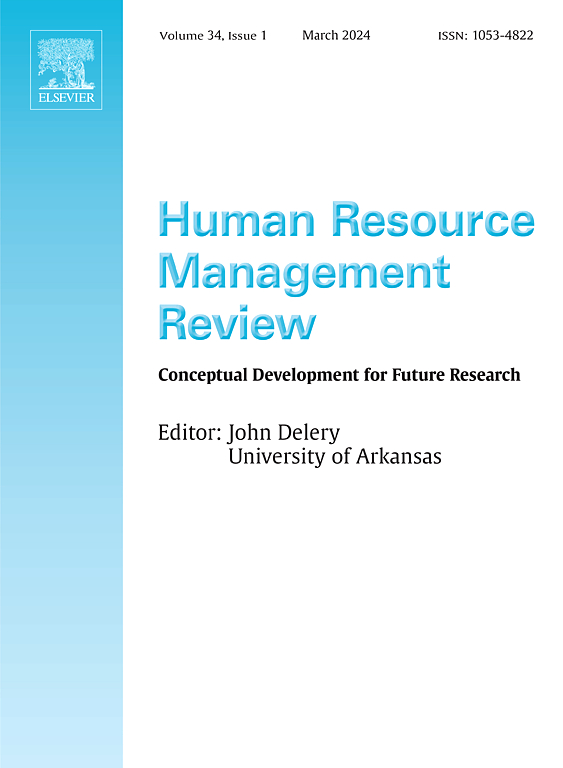Toward a theory of team resource mobilization: A systematic review and model of sustained agile team effectiveness
IF 13
1区 管理学
Q1 MANAGEMENT
引用次数: 0
Abstract
The notion of resources is central to many theories in HRM and applied psychology. Prominent resource-based theories in HRM tend to focus on issues related to accessing resources at the firm-level (e.g., resource-based view of the firm) or the employee-level (e.g., job demands - resources theory). However, at the team-level, the critical issue is often a matter of resource mobilization rather than resource access. Previous research has discovered that a team's ability to use resources effectively is indicative of collective intelligence. Instead of explaining this ability with a latent collective intelligence factor, we argue that teams can develop this ability by using agile work practices (AWPs). Through a systematic review of the agile team literature, we describe how agile teams mobilize resources embedded in the internal and external environment to achieve sustained team effectiveness. Generalizing beyond the agile team context, we propose a model that introduces team-internal and team-external resource mobilization as unique predictors of sustained team effectiveness. We further propose that resource mobilization is strengthened by challenge demands (e.g., work complexity) and weakened by hindrance demands (e.g., role conflict). We hope our model of sustained team effectiveness inspires future research into how teams can perform effectively across multiple episodes, without this going at the cost of members' health and well-being.
迈向团队资源动员理论:持续敏捷团队效能的系统回顾与模型
资源的概念是人力资源管理和应用心理学中许多理论的核心。人力资源管理中突出的资源基础理论倾向于关注与公司层面(例如,公司的资源基础观点)或员工层面(例如,工作需求-资源理论)获取资源相关的问题。然而,在团队一级,关键问题往往是资源调动问题,而不是资源获取问题。先前的研究发现,一个团队有效利用资源的能力表明了集体智慧。我们认为,团队可以通过使用敏捷工作实践(awp)来发展这种能力,而不是用潜在的集体智慧因素来解释这种能力。通过对敏捷团队文献的系统回顾,我们描述了敏捷团队如何调动内部和外部环境中的资源来实现持续的团队效率。在敏捷团队的背景下,我们提出了一个模型,将团队内部和团队外部资源动员作为持续团队效率的独特预测因素。我们进一步提出,挑战需求(如工作复杂性)加强了资源调动,阻碍需求(如角色冲突)削弱了资源调动。我们希望我们的持续团队效率模型能够启发未来的研究,即团队如何在不以成员的健康和福祉为代价的情况下,在多个事件中有效地执行。
本文章由计算机程序翻译,如有差异,请以英文原文为准。
求助全文
约1分钟内获得全文
求助全文
来源期刊

Human Resource Management Review
MANAGEMENT-
CiteScore
20.20
自引率
7.00%
发文量
0
审稿时长
48 days
期刊介绍:
The Human Resource Management Review (HRMR) is a quarterly academic journal dedicated to publishing scholarly conceptual and theoretical articles in the field of human resource management and related disciplines such as industrial/organizational psychology, human capital, labor relations, and organizational behavior. HRMR encourages manuscripts that address micro-, macro-, or multi-level phenomena concerning the function and processes of human resource management. The journal publishes articles that offer fresh insights to inspire future theory development and empirical research. Critical evaluations of existing concepts, theories, models, and frameworks are also encouraged, as well as quantitative meta-analytical reviews that contribute to conceptual and theoretical understanding.
Subject areas appropriate for HRMR include (but are not limited to) Strategic Human Resource Management, International Human Resource Management, the nature and role of the human resource function in organizations, any specific Human Resource function or activity (e.g., Job Analysis, Job Design, Workforce Planning, Recruitment, Selection and Placement, Performance and Talent Management, Reward Systems, Training, Development, Careers, Safety and Health, Diversity, Fairness, Discrimination, Employment Law, Employee Relations, Labor Relations, Workforce Metrics, HR Analytics, HRM and Technology, Social issues and HRM, Separation and Retention), topics that influence or are influenced by human resource management activities (e.g., Climate, Culture, Change, Leadership and Power, Groups and Teams, Employee Attitudes and Behavior, Individual, team, and/or Organizational Performance), and HRM Research Methods.
 求助内容:
求助内容: 应助结果提醒方式:
应助结果提醒方式:


